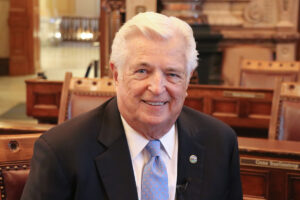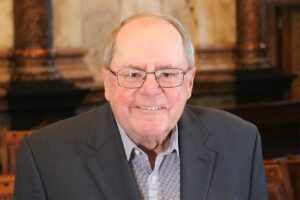
Interview of Pamela Johnson Betts, March 25, 2022
Interviewed by Eric Sexton
The interview begins with Pamela Johnson Betts talking about attending Washington Elementary School, which was one of the schools noted in the landmark Brown v. Board Education case that overturned segregation. She describes her friendship with Cheryl Brown Henderson, daughter of Rev. Oliver Brown who was the plaintiff in the case, and the fact that the family never talked about the landmark case. The two women worked on saving the Monroe school building in the early days before it became a national historic site. This was the beginning of a 50 year career in public service Show Morefor both. Ms. Johnson Betts also talks about an experience she had in the 7th grade when a teacher slapped her (the only African-American student in the class) and the lessons from that experience.
Later in the interview she compares the leadership styles of the three governors with whom she worked and some of the public policy issues she was responsible for managing, such as childhood immunizations, public health. Her own experience in working on issues affect the elderly was shaped by those earlier experiences. She was fortunate to find other African American women role models in top management positions, such as Dr. Joycelyn Elder, Surgeon General of the United States. Even as a member of the Governor's cabinet, she continued to experience incidences of racism directed at her. She talks candidly about how she dealt with those incidents and their impact on her. The interview concluded with her stating that "public service is the rent we pay for living on this earth." Show Less

Interview of Eugene Anderson, April 21, 2022
Interviewed by Frances Jackson
Senator Eugene Anderson's oral history interview covers his 20-year career in Kansas politics, serving in both the Kansas House and Senate and later, in the administration of Governor Joan Finney. In addition, Anderson has been a Wichita business man and author. Anderson described growing up in Georgia and the values he learned in his segregated community - work hard, never quit, build relationships and make your community better. His priority issue when he went to the legislature was making the schools better. Anderson described his friendship with Governor Joan Finney, going back to when she was Show MoreState Treasurer and how he asked her not to invest in the apartheid government in South Africa. Later, she appointed him Director of Aviation and he was able to work with other state directors to support the Kansas aviation industry on product liability legislation. Throughout the interview Anderson revealed his philosophy of effective governance. Show Less

Interview of Melody McCray-Miller, April 21, 2022
Interviewed by Frances Jackson
Melody McCray-Miller describes her job as speaking truth to issues that were relevant at that time, and representing a group of people who were marginalized. Rep. Miller was not the "status quo." She doesn't consider herself a "politician" but instead, a public servant. Her concept of public policy or public service was influenced by the fact that she is a Black woman who was raised in a Black family. She is the daughter of Billy Q. McCray, the first African American Commissioner in Sedgwick County who also served as a state Senator. Show More One of her mentors described her as "tough as leather." Miller was in business with her husband, and also taught school prior to running for office. She detailed how she handled conflicts or incidents of racial discrimination by "pushing forward." The latter part of the interview deals with a variety of legislative issues McCray-Miller initiated or followed. Those issues ranged from early childhood education, to payday lending, juvenile justice and health policy. Show Less

Interview of Delia Garcia, April 21, 2022
Interviewed by Frances Jackson
Garcia's interview describes how she was recruited to run for the Kansas Legislature and how she learned how to be a successful leader. She had many role models from Texas Senator Leticia Van der Putte, to Governors Finney and Sebelius, and Sr. Therese Bangert. She told a story about a legislative colleague who complimented her on speaking good English while she was debating a measure requiring English as the official language. Garcia felt humiliated and angry, but one of her mentors talked her out of quitting. She used that experience to begin intentionally training women, Show Moreparticularly women of color, to run for political office. She has written a book on national Latina leadership, to be published at the end of 2022. Garcia also shares her thoughts on immigration and immigrant rights. She cites the fact that Kansas was the fourth state in the country to pass in-state tuition for undocumented students in 2004. To her, immigration policy has an economic impact. Congress should be willing to come to the table and talk, discuss and even compromise to find a solution. The interview concludes with a description of a program at Wichita State University that invests in developing leadership for students. Show Less

Interview of Lawton Nuss, July 27, 2022
Interviewed by Richard Ross
Retired Chief Justice Lawton Nuss describes his attempts to be appointed to the Court of Appeals (he was not) and to the Supreme Court. Nuss served as Acting Chief during the illness of Chief Justice Davis. After becoming Chief Justice in 2010 he became the chief spokesman and administrator for the entire judicial branch of nearly 1600 employees and 250 judges. In 2014-15 he appointed a Court Budget Advisory committee to help resolve an eight million dollar budget shortfall. He discussed at length the legislative reaction to the Gannon v State school finance case which was Show Morefiled in 2010 and not finally resolved until 2019. Nuss describes his work with the conservative leadership in the state legislature, and a conservative governor, and their attempts to gain more control over the courts. He dealt with budget shortfalls that resulted in closing the courts; attempts to elect rather than appoint judges; and threats to change the role of the courts in the constitution. Nuss was a vigorous defender of the judicial system's independence against legislative interference. He cited the Supreme Court’s Solomon case which essentially answered the question, "‘Should the judicial branch have to give away some of its power granted directly by the people in their Constitution in order to get funding from the legislature.” The court's decisions on school finance continued to provoke the legislature during his tenure. Show Less

Interview of David Owen, July 22, 2022
Interviewed by David Webb
Dave Owen's name is well known to most Kansans who follow politics. This interview is replete with stories about how Republican politics in the 60's, 70's, 80's worked. Stories include his friendships with Senator Bob Dole and Governor Bob Docking. One of his lasting accomplishments as Lt. Governor was the creation of the Kansas Cavalry for promoting business development. He left elective politics in 1972 but chaired Dole's Vice-Presidential run in 1976. His interests turned to banking and he became Chairman and CEO of the Bank of Stillwell. His affiliation with Ottawa University athletics Show Moreand his love of basketball led to the creation of the Dave Owen Leadership Institute. He will be leading a delegation to Ukraine this fall, 2022 from the Lenexa Baptist Church and the Leadership Institute. Show Less

Interview of Phillip Martin, August 19, 2022
Interviewed by David Webb
Phil Martin served southeast Kansas, as county treasurer, senator, appraiser and and Kansas as the Director of Property Valuation. He influenced major tax changes like reappraisal & classification and the implementation of the severance tax while in state government. In this oral history interview, he recalls people with whom he served and the issues that arose during his years of public service.

Interview of Anthony Hensley, September 16, 2022
Interviewed by Alan Conroy
Senate Minority Leader Anthony Hensley was first elected to the Kansas House of Representatives in 1976 at the age of 22. He moved to the Senate in 1992, finishing an unexpired term of Senator Nancy Parrish. His interview covers his 44 years in the House and Senate, and almost every issue the legislature dealt with in those years: taxes, reapportionment, school finance and labor issues, to name a few. His story about negotiating with Dick Bond to increase funding for schools is a "must read". Hensley's description of how the Show MoreBrownback tax cuts were enacted after the Senate reconsidered its vote to kill them is a lesson in how parliamentary maneuvering between House and Senate can have unexpected consequences.
Highlights -- short excerpts from the interview
